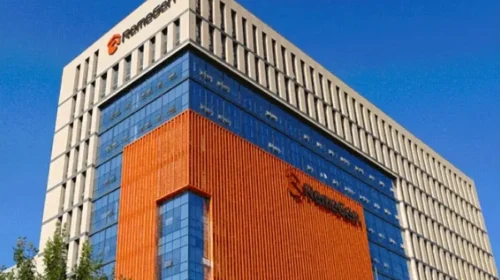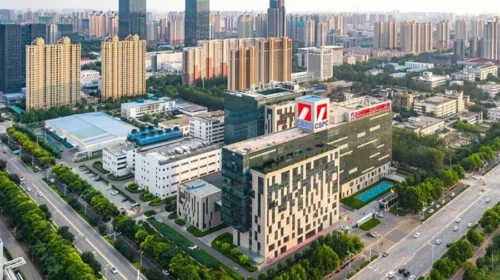CSPC Pharma taps R&D superstar in quest for new breakout drugs

Liu Yongjun’s drug commercialization experience and ties to multinational firms are urgently needed for his new employer’s ongoing transformation
Key Takeaways:
- CSPC Pharma’s new R&D head Liu Yongjun engineered the successful tie-up between his former employer Innovent Biologics and France’s Sanofi
- CSPC is looking for its next star drug after its revenue rose just 1.3% in the first half of 2024, and as its drugs come under pricing pressure from China’s centralized procurement
By Molly Wen
The top echelons in China’s innovative drug sector have become a game of corporate hopscotch, with proven executives in big demand from a group of companies with few standouts.
In one of the latest such corporate leaps, leading established drug maker CSPC Pharmaceutical Group Ltd. (1093.HK) welcomed Liu Yongjun as its new executive president and president of global R&D last week, less than 20 days after Liu formally left his former employer Innovent Biologics (1801.HK).
Liu has plenty of stripes to his name and is well-known in China’s pharmaceutical sector. With extensive background in both academic research and product development, he is among an elite group of Chinese scientists to serve in top R&D positions at large multinational drug companies. His resume includes more than 30 years in his areas of expertise in immunology, oncology, and translational medicine, with top R&D roles at France’s Sanofi and Britain’s AstraZeneca.
Before his latest leap, Liu oversaw global R&D, pipeline strategy, and commercial cooperation for four years at Innovent. Under his management, the company’s approved drugs for sale increased from just two to 10. Innovent’s core product, its Sintilimab injection, was approved for six new indications during that time. In a fiercely competitive PD-1 market, it became the only one to be included in China’s medically insured national drug catalogue for first-line treatment of the five most prevalent cancers.
Liu also forged a close partnership between Innovent and Sanofi, paving the way for Innovent’s introduction of two Sanofi clinical-stage drugs to China and its receipt a 300 million euro ($333 million) strategic equity investment from the French giant.
Liu’s extensive experience in commercializing innovative drugs and connections with multinational drug companies are exactly the medicine that’s urgently needed at CSPC right now. Since it began investing heavily in new drug R&D in 2018, the company has launched more than 300 projects to develop five major new drug areas, including cardiovascular, metabolic diseases, anti-tumor, psycho-neurological and anti-infective. But only three of its drugs have gotten regulatory approval, and the rest remain in development.
Liu isn’t the first to jump from an innovative drug company to a more established local player like CSPC. Former CStone Pharmaceuticals (2616.HK) President Jiang Ningjun made a similar move when he joined Hengrui Pharmaceuticals (600276.SH) in January 2023 to take charge of that company’s clinical research and business development.
Investors weren’t too impressed with Liu’s appointment, and are generally unexcited about CSPC Pharma’s stock right now. The shares are down more than 20% since the company released its financial results for the first half of 2024 on Aug. 21. And rather than welcome Liu with a rally, investors continued dumping CSPC’s shares to the tune of a 4.6% decline over the three trading days after the announcement.
Stagnating revenue
CSPC brought in 16.3 billion yuan ($2.3 billion) in revenue in the first half of this year, up just 1.3% from a year earlier, while its net profit edged up by a similar 2% to 3.2 billion yuan. Its revenue for finished drugs increased by 5% to 13.6 billion yuan. Among its key therapeutic areas, its nervous system drugs were the biggest contributor with 5.24 billion yuan, up 15%, accounting for about a third of total revenue.
NBP, an acute ischemic stroke treatment that is CSPC’s biggest psychiatry and neurology drug, brought in more than 6.6 billion yuan in 2022, according to public data. Its latest results show NBP sales via over-the-counter and retail channels have continued to rise with the introduction of two different methods of taking the drug, driving the segment’s growth.
But generic versions of the drug are already lining up for regulatory approval after NBP’s patents expired at the end of last year. That’s raising concerns that CSPC’s revenue and profit could take a hit once those generics reach the market.
In the cancer treatment area, CSPC mostly produces chemotherapeutic drugs, such as the long-acting white blood cell booster drugs Jinyouli and Keaili. That sets it apart from other Chinese cancer drug startups that often engage in more cutting-edge products focused on biologically targeted therapies.
What’s more, CSPC’s two drugs have been included in China’s centralized national procurement program, which brings potential for greater sales but also pressures companies to give lower prices. In the first half of the year, revenue from CSPC’s anti-tumor business fell 10.2% to 2.68 billion yuan. The company said sales of its star Duomeisu cancer treatment also declined after it was included in some centralized procurement programs.
The clock is rapidly ticking for CSPC to find its next star drug after NBP and Duomeisu. That may explain its ramp-up in R&D spending, which rose 10.3% to 2.54 billion yuan in the first half of 2024 year-on-year. The company currently has about 60 key drugs in the clinical or pre-clinical stages, of which seven have submitted applications for final approval and 19 are in the process of registering for clinical trials.
CSPC also continues to invest in developing its pipeline. It acquired KN026, an HER2-targeted dual antibody, from Alphamab Oncology (9966.HK) for 1 billion yuan in 2021. And it paid another 1 billion yuan to jointly develop the drug Batoclimab with HBM Holdings (2124.HK) in 2022.
CSPC and Hengrui are generally considered comparable among China’s older pharmaceutical companies seeking to cross over to innovative drug development. Hengrui recorded 13.6 billion yuan in revenue during the first half of 2024, less than CSPC. But Hengrui’s revenue growth was much higher at 22%, and innovative drugs contributed half of its total. That may explain why Hengrui’s price-to-earnings (P/E) ratio stands at 53 times, far ahead of the 8 for CSPC.
Its slow revenue growth and rapid decline of its two star drugs have taken their toll on CSPC, leading investors to punish the stock with such a low valuation. Those investors weren’t too impressed with Liu’s arrival and potential to revive CSPC’s growth. Now, all eyes will be watching to see whether this newcomer with a superstar resume is the medicine the company needs to make a comeback.
To subscribe to Bamboo Works free weekly newsletter, click here






